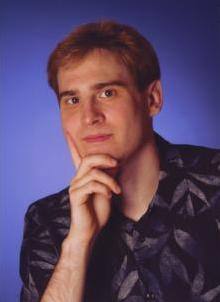RESEARCH INTERESTS
CPT- and Lorentz symmetry violationMy work focuses on studying CPT- and
Lorentz violation, which is motivated by certain
prototype fundamental theories such as string
theory and loop quantum gravity. The field is a thrust
in modern fundamental research, since Lorentz violation
is a clear indicator for physics
at the Planck scale and its discovery would radically
change our physical paradigm. The community is very
active with hundreds of research papers produced over
the past 15 years on theory and experiment.
The research is carried out within the Standard-Model
Extension (SME), which is a low-energy effective
framework for parameterizing such
violations in the Standard Model of elementary particle
physics and General Relativity. The minimal SME involves
all operators with a mass dimension ≤ 4, whereas the
nonminimal part comprises all higher-dimensional
operators. My interests within the
SME are multifold. They range from theoretical aspects
auch as the properties of Lorentz-violating quantum
field theories to more
phenomenological topics, e.g., constraining
Lorentz-violating coefficients by measurements.
Particle
Phenomenology
Experimental data on
ultra-high energy cosmic rays provide an essential basis
for the search for CPT- and Lorentz violation.
In the past vacuum Cherenkov radiation was studied
thoroughly for many sectors of the SME. In contrast, not
much research has been carried out on photon decay and
there is a great potential in obtaining new bounds from
recent data on ultra-high energy photons (measured,
e.g., by H.E.S.S). From the modified photon dispersion
relation the decay rate would be computed within the
nonstandard quantum field theory based on the
Lorentz-violating coefficients to be bounded. This
allows for gaining information on the efficiency of the
process. The bounds follow from the modified kinematics
and the experimental data.
Quantum Field Theory
The SME is based on the concept of field theory and after quantization it describes the physics of all Standard-Model particles in the
presence of Lorentz violation. I find it fascinating to explore the properties of such modified quantum field theories and to investigate
whether they are still well-behaved. This concerns a large variety of characteristics such as microcausality, unitarity, stability, etc. In a
series of research articles Lorentz-violating quantum field theories were investigated where I mainly focused on the
CPT-even photon sector
and the nonminimal fermion sector. My calculations were carried out in perturbation theory with respect to the fine structure constant. They
involve the computation of modified free-field objects such as photon polarization vectors, fermion spinors, and propagators. These are then
used to either show the properties mentioned above or to demonstrate that they do not hold for certain cases. All results obtained in the past
years suggest that quantum field theories seem to be very robust with respect to Lorentz violation, i.e., except for some rare, pathological
cases they are well-behaved at tree-level.
Modifications
of General RelativityThe SME includes a framework for a modified
theory of gravity. The recent approach of Finsler
geometry is very promising to describe Lorentz-violating
background fields in curved spacetimes. However it is
still in its infancy and there are many questions to be
answered.
|
EDUCATION and POSITIONS
October 2015 - present
Visiting Scientist
Universidade Federal do Maranhão, São Luís, MA, Brazil
August 2013 - July
2015
Leopoldina Fellow
Indiana University, Bloomington, IN, U.S.A.
November 2012 - July 2013
Postdoc
ANKA Storage Ring,
Karlsruhe Institute of Technology
(KIT),
Germany
November 2010 - September 2012
Postdoc
Institute for Theoretical Physics,
KIT, Germany
August 2007 - October 2010
Ph.D. student
Institute for Theoretical Physics,
KIT, Germany
October 2001 - June 2007
PHYSICS studies
July 2006 - June 2007
Masters diploma in PHYSICS
Institute for Theoretical Particle Physics
University of Karlsruhe, Karlsruhe, Germany
|
